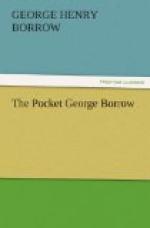’No, sir; the truth is, that of late I have been very much occupied with various matters, otherwise I should, perhaps, have been able to afford you some information. Boxing is a noble art.’
‘Can you box?’
‘A little.’
’I tell you what, my boy; I honour you, and, provided your education had been a little less limited, I should have been glad to see you here in company with Parr and Whiter; both can box. Boxing is, as you say, a noble art—a truly English art; may I never see the day when Englishmen shall feel ashamed of it, or blacklegs and blackguards bring it into disgrace! I am a magistrate, and, of course, cannot patronize the thing very openly, yet I sometimes see a prize-fight. I saw the Game Chicken beat Gulley.’
* * * * *
One day it happened that, being on my rambles, I entered a green lane which I had never seen before; at first it was rather narrow, but as I advanced it became considerably wider; in the middle was a driftway with deep ruts, but right and left was a space carpeted with a sward of trefoil and clover; there was no lack of trees, chiefly ancient oaks, which, flinging out their arms from either side, nearly formed a canopy, and afforded a pleasing shelter from the rays of the sun, which was burning fiercely above. Suddenly a group of objects attracted my attention. Beneath one of the largest of the trees, upon the grass, was a kind of low tent or booth, from the top of which a thin smoke was curling; beside it stood a couple of light carts, whilst two or three lean horses or ponies were cropping the herbage which was growing nigh. Wondering to whom this odd tent could belong, I advanced till I was close before it, when I found that it consisted of two tilts, like those of waggons, placed upon the ground and fronting each other, connected behind by a sail or large piece of canvas, which was but partially drawn across the top; upon the ground, in the intervening space, was a fire, over which, supported by a kind of iron crowbar, hung a cauldron. My advance had been so noiseless as not to alarm the inmates, who consisted of a man and woman, who sat apart, one on each side of the fire; they were both busily employed—the man was carding plaited straw, whilst the woman seemed to be rubbing something with a white powder, some of which lay on a plate beside her. Suddenly the man looked up, and, perceiving me, uttered a strange kind of cry, and the next moment both the woman and himself were on their feet and rushing upon me.
I retreated a few steps, yet without turning to flee. I was not, however, without apprehension, which, indeed, the appearance of these two people was well calculated to inspire. The woman was a stout figure, seemingly between thirty and forty; she wore no cap, and her long hair fell on either side of her head, like horse-tails, half-way down her waist; her skin was dark and swarthy, like that of a toad, and the expression of her countenance was particularly




